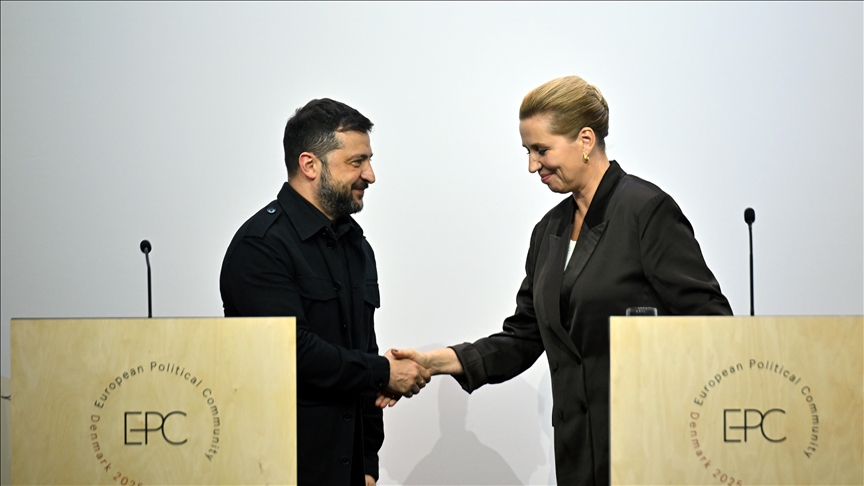COPENHAGEN
European leaders have reaffirmed their backing for Ukraine at the close of the European Political Community summit, with Denmark’s prime minister warning that Russia is “testing” Europe through provocations and hybrid attacks.
Danish Prime Minister Mette Frederiksen began by offering condolences after an attack outside the Heaton Park Hebrew Congregation synagogue in Manchester.
“First of all, let me start by expressing my deepest sympathy to the British people and to the Jewish community and to our friend Keir Starmer, who had to leave the summit today.
The incident in Manchester is terrible and horrifying, and my thoughts are with the affected families in these difficult times.”
Turning to Ukraine, Frederiksen said the meetings confirmed “our unwavering support” in the face of “increased” provocations from Moscow towards Europe.
“It is clear to everybody that Russia is a threat, not only to Ukraine, but to all of Europe,” she said.
“Russia is testing us, and more than ever, we need to stand strong together,” she said, citing airspace violations, drone attacks, pressure on borders, interference in democratic elections, and cyberattacks on critical infrastructure.
‘Every euro send to Ukraine is direct investment in European security’
Frederiksen called for stronger backing for Kyiv, both through weapons supplies and additional sanctions against Russia.
“I would like all Europeans to look at it this way, that every euro or dollar or Danish krone we send to Ukraine is a direct investment in European security,” she said. “The task ahead is to make Europe so strong that a war against us is no longer an option.”
On the issue of EU enlargement, Frederiksen stressed that 26 member states are united, despite Hungary’s opposition to Ukraine joining the bloc.
“I will not allow one country, and I will certainly not allow (Hungary’s Premier) Viktor Orban to take decisions about the entire European future,” she said. “So I don’t know what middle ground is, but if middle ground means that we won’t do what is the best thing to do for Europe, then I don’t think middle ground is a good idea.”
When asked if Denmark and Europe as a whole are willing to help Ukraine scale up its drone and missile production, she simply said, “Yes.”
Using frozen Russian assets
Meanwhile, Ukrainian President Volodymyr Zelenskyy was questioned about potential strikes on Russian energy infrastructure as well as the possibility of Kyiv acquiring long-range missile systems. He insisted that Ukraine acts only in response to Russian attacks.
On the question of long-range capabilities, he said: “After my meeting with the president of the US, yes, we will, maybe, have something more. I don’t know. We’ll see.”
Frederiksen said work on Ukraine’s EU accession should continue despite Budapest’s opposition. “If we are not able to convince Orban, then I simply think we just have to move on with all the work that has to be done between Ukraine and the European Commission,” she said.
On reparation loans for Ukraine, she acknowledged “lots of questions” of a technical and legal nature remain but said the matter ultimately required a political decision. “I know that the government in Belgium finds this very difficult, but my hope is, and my belief is, that we will be able to find a solution that will get support from all 27 countries.”
The EPC was launched in 2022 at the initiative of French President Emmanuel Macron in response to Russia’s war on Ukraine.
It was designed as a forum for dialogue and cooperation between European nations, both inside and outside the EU, without the formality of state visits.
